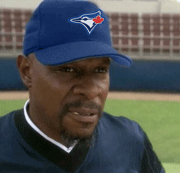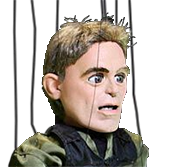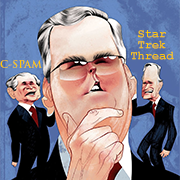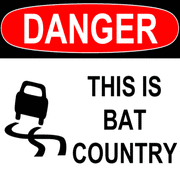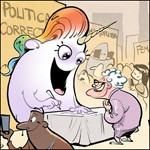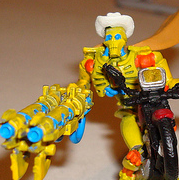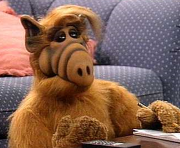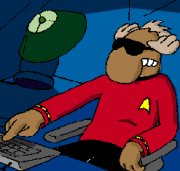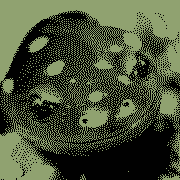|
I'm watching The Final Frontier now and I think the high point so far, for better or for worse, is seeing all the blatant TNG sets and corridors they reused. One shot of their jailbreak just now had the same lighting as TNG even, straight off the Enterprise-D. edit: by the way I have seen another gem in Shatner's directorial work, and I get the feeling he got a lot of help making Final Frontier https://www.youtube.com/watch?v=Ldd_bJp1V_I piratepilates fucked around with this message at 02:25 on Aug 19, 2020 |
|
|
|

|
| # ? May 14, 2024 19:40 |
|
Farmer Crack-rear end posted:Hold on, the Federation was fighting a war with the Cardassians for years, and then basically immediately negotiated a truce right after the Borg ripped a chunk out of Starfleet. When were they supposed to have had time to intervene at Bajor?
|
|
|
|
I always sort of figured that the Federation were fighting the Cardassians with one hand tied behind their back because they didn't want to really engage on a total war footing, so it drew out a conflict with a polity that was blatantly a second-rate power in the Quadrant and they could have squashed if they really flexed their muscles. There's plenty of resources, time, and manpower available for the Federation to intervene if they really wanted to and the Bajorans' grudge is pretty justifiable.
|
|
|
|
piratepilates posted:I'm watching The Final Frontier now and I think the high point so far, for better or for worse, is seeing all the blatant TNG sets and corridors they reused. One shot of their jailbreak just now had the same lighting as TNG even, straight off the Enterprise-D. Only fair given how TNG inherited so much of the TOS movie stuff.
|
|
|
|
Senor Tron posted:Only fair given how TNG inherited so much of the TOS movie stuff. TMP -> movies -> TNG -> VOY they had a good 22 year run with those sets, served them well. Anyway I finished it and it was fine, I won't say it's bad, but not one I'll come back to often. It feels weirdly balanced, with so much of the movie spent with Nimbus 3 being set-up, and Sybok's coup, and the Enterprise not being ready, and the Klingons, and the attack mission on Nimbus, and Sybok getting to the ship, and Sybok taking over the ship, and the jailbreak, and the three heroes on the run, and the three heroes being convinced by Sybok, and getting to the god planet, and then finally we're at the god planet and we're like 80 minutes in to our 106 minute movie and we're ready to start with the whole god operation and it turns out Sybok was just taken in by an obvious scam and the entire plot of the movie is simply unraveled with the line "what does god need with a starship?" and it turns out this entire thing was for nothing. There was no god, he was just some rear end in a top hat, Sybok's peaceful revolution was just him sending $2000 in iTunes gift cards to god and a klingon warbird blowing the heck out of him. Kirk and Spock are friends, the end. Let's go camping. piratepilates fucked around with this message at 04:25 on Aug 19, 2020 |
|
|
|
Iím pretty sure the sickbay on Enterprise used some bits from the TNG/TMP sets.
|
|
|
|

|
|
|
|
Not only does he play the trombone, but he's wildly mediocre at it.
|
|
|
|
curiousTerminal posted:If you know enough about TNG through cultural osmosis this is fine, but there's a few TNG episodes that set the tone for DS9's major plot arcs that you'd be remiss in skipping. You don't necessarily have to watch all of TNG, but these episodes are at least a good idea. Hey thanks, I'll change course and get some TNG. I'd like for a series to actually stick with me and want to enjoy it but I'll see.
|
|
|
|
Lemniscate Blue posted:I always sort of figured that the Federation were fighting the Cardassians with one hand tied behind their back because they didn't want to really engage on a total war footing, so it drew out a conflict with a polity that was blatantly a second-rate power in the Quadrant and they could have squashed if they really flexed their muscles. There's plenty of resources, time, and manpower available for the Federation to intervene if they really wanted to and the Bajorans' grudge is pretty justifiable. 'The Wounded' is one of the better episodes because it delves into the moral tangle of not-quite-war and deals with a whole load of really complicated elements. 'Yes the Cardassians are absolutely bad guys, but that still doesn't mean racism is okay.' The episode has Picard deliberately acting to control what he 'officially' knows so that the Federation isn't forced to declare war, which looks weak until you consider that the tally at the end is that the Federation has blown up several Cardassian ships and outposts and isn't going to pay at all for it.
|
|
|
|
rewatching voyager feels a lot like i'm slowly losing my mind https://www.youtube.com/watch?v=qIjOifRG-u8
|
|
|
|
Oh come on, that's a fun episode. "Warning: Warp Core breech a lot sooner than you think." "Last chance to be a hero Doctor. Get going!"
|
|
|
|
it's true doctor episodes are the best but that intro is... a lot
|
|
|
Farmer Crack-rear end posted:Hold on, the Federation was fighting a war with the Cardassians for years, and then basically immediately negotiated a truce right after the Borg ripped a chunk out of Starfleet. When were they supposed to have had time to intervene at Bajor? The Federation never going on a total war footing makes sense, given their deep rooted pacifist ideals. The starships they build would, in a sense, be a threat to the regional balance of power, given that starships seem to be functional military assets for decades at least. The Cardassians would probably be able to step up to match for a while. And in the end, what would the service of all of that be? Of course I doubt anyone complained about Starfleet building back to pre Wolf 359 levels. And of course, the Dominion was another kettle of Bolian navel-fish.
|
|
|
|
|
Lemniscate Blue posted:I always sort of figured that the Federation were fighting the Cardassians with one hand tied behind their back because they didn't want to really engage on a total war footing, so it drew out a conflict with a polity that was blatantly a second-rate power in the Quadrant and they could have squashed if they really flexed their muscles. There's plenty of resources, time, and manpower available for the Federation to intervene if they really wanted to and the Bajorans' grudge is pretty justifiable. People say (with varying degrees of success) the same thing about every war the US has been involved with since Korea. Shits complicated though. Could Starfleet have committed more to the war? Probably. What is the end goal? An occupation of Cardassia and millions+ of refugees or a negotiated ceasefire? Does the average Federation citizen want to deal with dilithium rationing and/or a draft to achieve this goal? Does Starfleet think it is a valuable use of resources to churn out a bunch of Galaxy class ships that are just engines and weapons bolted to an otherwise empty hull? What do they plan on doing with these scientifically useless ships once the war is over, assuming they are even completed on time?
|
|
|
|
Alchenar posted:'The Wounded' is one of the better episodes because it delves into the moral tangle of not-quite-war and deals with a whole load of really complicated elements. 'Yes the Cardassians are absolutely bad guys, but that still doesn't mean racism is okay.' The episode has Picard deliberately acting to control what he 'officially' knows so that the Federation isn't forced to declare war, which looks weak until you consider that the tally at the end is that the Federation has blown up several Cardassian ships and outposts and isn't going to pay at all for it. I was gonna chime in and say that no list of prerequisite TNG episodes to watch before starting DS9 is complete without The Wounded. Not only does it introduce the Cardassians, but it's a great character episode for O'Brien.
|
|
|
|
Cat Hatter posted:People say (with varying degrees of success) the same thing about every war the US has been involved with since Korea. Shits complicated though. Could Starfleet have committed more to the war? Probably. What is the end goal? An occupation of Cardassia and millions+ of refugees or a negotiated ceasefire? Does the average Federation citizen want to deal with dilithium rationing and/or a draft to achieve this goal? Does Starfleet think it is a valuable use of resources to churn out a bunch of Galaxy class ships that are just engines and weapons bolted to an otherwise empty hull? What do they plan on doing with these scientifically useless ships once the war is over, assuming they are even completed on time? And none of that would understandably and justifiably matter to the Bajorans.
|
|
|
|
Gordon Shumway posted:I was gonna chime in and say that no list of prerequisite TNG episodes to watch before starting DS9 is complete without The Wounded. Not only does it introduce the Cardassians, but it's a great character episode for O'Brien. Adding my support for this. Great episode of TV regardless of the show, imho
|
|
|
|
Kibayasu posted:And none of that would understandably and justifiably matter to the Bajorans. It wouldn't, they got a bit of a raw deal. Shits complicated. Even then, with the exceptions of earlier intervention and Gul heads on pikes, the Bajorans still got what they wanted from Starfleet's war as it was waged. The Bajorans got their independence but many didn't want much help from the Federation in fear of becoming subservient to a new power.
|
|
|
|
Cat Hatter posted:People say (with varying degrees of success) the same thing about every war the US has been involved with since Korea. Shits complicated though. Could Starfleet have committed more to the war? Probably. What is the end goal? An occupation of Cardassia and millions+ of refugees or a negotiated ceasefire? Does the average Federation citizen want to deal with dilithium rationing and/or a draft to achieve this goal? Does Starfleet think it is a valuable use of resources to churn out a bunch of Galaxy class ships that are just engines and weapons bolted to an otherwise empty hull? What do they plan on doing with these scientifically useless ships once the war is over, assuming they are even completed on time? How many Federation citizens' homes are worth inconveniencing the lives of the average Federation citizen? Is this the Federation's standard policy against territory-grabbing warmongering empires? If some group invaded in force and occupied all of Vulcan, would the Federation rather negotiate to relocate the rest of the Vulcan population to Earth than step up its military to deal with the threat? The Maquis weren't just loosely allied with the Federation like how the US blunders into its modern wars, they were full-blooded citizens, born and raised to expect the protection of their government until it was suddenly rescinded. And the effectiveness of that strategy feels questionable from how the Cardassians and Romulans were constantly preparing for some kind of offensive that they only didn't do because of some totally unexpected turn of events.
|
|
|
|
Uhura's actress got her money and home stolen by a huge piece of poo poo and her kids are.running a gfm: https://www.gofundme.com/f/shields-up-nichelle-nichols
|
|
|
|
SlothfulCobra posted:How many Federation citizens' homes are worth inconveniencing the lives of the average Federation citizen? Is this the Federation's standard policy against territory-grabbing warmongering empires? If some group invaded in force and occupied all of Vulcan, would the Federation rather negotiate to relocate the rest of the Vulcan population to Earth than step up its military to deal with the threat? The Maquis weren't just loosely allied with the Federation like how the US blunders into its modern wars, they were full-blooded citizens, born and raised to expect the protection of their government until it was suddenly rescinded. The only way to read the Federation as the shows present it is that it just so happens to have border disputes with every major or minor galactic power it is in proximity to caused by the presence of newly established colonies. The Federation is a hyper aggressive and expansive entity that's furiously grabbing land in all directions while plotting expansion centuries in advance (I mean what are you going to do when your civilisation finally makes it to space and you find out that everything in a 10k light year radius has a Federation flag on it and you are getting an 'offer' of membership?). TNG never gives us a war, it's not that kind of show, but count the number of times it pulls 'we just had a major war with these people' or 'we might be about to have a major war with these people'.
|
|
|
|
The growing premise in late era TNG and DS9 is that the Federation is not the humanist utopia it's cracked up to be. This is a pretty obvious place to go with it but also makes Star Trek just like pretty much every other piece of dystopian science fiction when it began as explicitly not that and contrary to that. But in my opinion bullshit like the Prime Directive and the central conceits of Star Trek should be explored, of course. There's also that very long-running Star Trek trope where there's no one above captain-level who isn't corrupt or incompetent, or at bare minimum hates one particular series regular for some dumb reason.
|
|
|
|
Sodomy Hussein posted:The growing premise in late era TNG and DS9 is that the Federation is not the humanist utopia it's cracked up to be. This is a pretty obvious place to go with it but also makes Star Trek just like pretty much every other piece of dystopian science fiction when it began as explicitly not that and contrary to that. But in my opinion bullshit like the Prime Directive and the central conceits of Star Trek should be explored, of course. There's also that very long-running Star Trek trope where there's no one above captain-level who isn't corrupt or incompetent, or at bare minimum hates one particular series regular for some dumb reason.
|
|
|
|
Sodomy Hussein posted:The growing premise in late era TNG and DS9 is that the Federation is not the humanist utopia it's cracked up to be. This is a pretty obvious place to go with it but also makes Star Trek just like pretty much every other piece of dystopian science fiction when it began as explicitly not that and contrary to that. But in my opinion bullshit like the Prime Directive and the central conceits of Star Trek should be explored, of course. There's also that very long-running Star Trek trope where there's no one above captain-level who isn't corrupt or incompetent, or at bare minimum hates one particular series regular for some dumb reason. I'm not sure if this is really a reasonable interpretation of DS9 or late-era TNG, for that matter. DS9's position is pretty explicitly that Federation morality is good and just, and more or less everything that challenges that on the show is meant to reinforce that. The only real difference with other Trek is that DS9 didn't necessarily always take the Federation's righteousness for granted.
|
|
|
|
I think later TNG and DS9 do step away from the idea of the Federation as a utopia (which I think is a good thing from a story telling perspective), but that doesn't mean the Federation is a dystopia. Even in Picard, which is the most critical of the the Federation not living up to its ideals and responsibilities, the Federation is still depicted as a great place to live. It's rich materially, and pretty egalitarian in the way that wealth is distributed (Picard's family estate aside), people have a good deal of leisure and freedom to pursue their interests, it's democratic, it's tolerant, it respects the rights of its people, and it's a source of hope to the rest of the galaxy. A place can be not a utopia and still a pretty great place to live.
|
|
|
|
I think the main insight of DS9 is that utopia is not just some perfect condition that stays perfect once you achieve it. It's more like a garden that has to be weeded, perpetually. People haven't actually become perfect (which is, somewhat, contrary to the idea that Roddenberry had been inching closer towards). They've just achieved a society that encourages the best in people.
|
|
|
|
I don't need to construct a whole thing where actually the Federation is evil, I think overall they probably hold the moral high ground between killer robots, the guys who can't shut up about how much they love killing, fascists, pointy-eared scheming fascists, liqui-fascists, and the Ferengi. I just also want the Federation to own up to their mistakes and failures, because of course they're not perfect. There's a lot left blank about the the war with Cardassia, but any way you slice it, the Federation hosed up. Either they're ceding the territory because they lost the war or they value pretty borders over people (whatever pretty borders look like in space). Maybe they genuinely don't understand why people don't want to abandon their homes, maybe they don't care and colonists have extremely little pull in Federation politics. You don't need to go galaxy brain about how actually they did nothing wrong.
|
|
|
|
Sir Lemming posted:I think the main insight of DS9 is that utopia is not just some perfect condition that stays perfect once you achieve it. It's more like a garden that has to be weeded, perpetually. People haven't actually become perfect (which is, somewhat, contrary to the idea that Roddenberry had been inching closer towards). They've just achieved a society that encourages the best in people. Gene was angling for "actually, human interpersonal conflict isn't a thing anymore!" near the end and driving his writing team crazy. But Gene is not Star Trek, thankfully.
|
|
|
|
SlothfulCobra posted:I don't need to construct a whole thing where actually the Federation is evil, I think overall they probably hold the moral high ground between killer robots, the guys who can't shut up about how much they love killing, fascists, pointy-eared scheming fascists, liqui-fascists, and the Ferengi. It is said that the alternative is continuing the war. Putting aside questions of Starfleet readiness or their willingness to do Operation Linebacker III, continuing the war means more deaths on both sides. How many Cardassian lives are equal to the value of a settler's home? How sure are we that the Cardassians are completely without claim to the area? War is complicated and terrible for both sides.
|
|
|
Sir Lemming posted:I think the main insight of DS9 is that utopia is not just some perfect condition that stays perfect once you achieve it. It's more like a garden that has to be weeded, perpetually. People haven't actually become perfect (which is, somewhat, contrary to the idea that Roddenberry had been inching closer towards). They've just achieved a society that encourages the best in people. ... which means everything.
|
|
|
|
|
SlothfulCobra posted:How many Federation citizens' homes are worth inconveniencing the lives of the average Federation citizen? Is this the Federation's standard policy against territory-grabbing warmongering empires? If some group invaded in force and occupied all of Vulcan, would the Federation rather negotiate to relocate the rest of the Vulcan population to Earth than step up its military to deal with the threat? The Maquis weren't just loosely allied with the Federation like how the US blunders into its modern wars, they were full-blooded citizens, born and raised to expect the protection of their government until it was suddenly rescinded. I thought TNG Journey's End pretty clearly stated that the territory there was already in dispute when people decided to go plant colonies there. We're not talking about homeworlds where societies have been around long enough to have history there. Think back to the old Oregon Country where the USA and UK had overlapping, conflicting territorial claims. (I know, this isn't a great analogy because there are also the Indians to consider, but bear with me.) A Brit living at Fort Vancouver (down on the Columbia River, mind) might well argue that the British claim on that land was valid, but the UK decided to sign a treaty where the border was set at the 49th parallel instead, hundreds of kilometers north of Fort Vancouver. Was the British government wrong in doing so? Similarly there were Americans who felt they had a valid claim well north of the 49th parallel.
|
|
|
|
DS9 portrays the Federation and its ideals as vulnerable, whereas TNG had barely started to show its cracks before it ended. There were times when TNG touched on the idea that indifferent people, zealots, and nationalists could pose a problem for even a utopian society - Measure of a Man, The Drumhead, probably a couple others if I trawl through the run - but for the most part the Federation's strength and ideals and benevolence were taken for granted and assumed to be too resilient to be troubled by the occasional case of rear end in a top hat Admiral Syndrome. EDIT: In other words, this: Sir Lemming posted:I think the main insight of DS9 is that utopia is not just some perfect condition that stays perfect once you achieve it. It's more like a garden that has to be weeded, perpetually. People haven't actually become perfect (which is, somewhat, contrary to the idea that Roddenberry had been inching closer towards). They've just achieved a society that encourages the best in people.
|
|
|
|
Sodomy Hussein posted:Gene was angling for "actually, human interpersonal conflict isn't a thing anymore!" near the end and driving his writing team crazy. But Gene is not Star Trek, thankfully. Thatís always been bewildering to me.
|
|
|
|
I think another thing that's not talked about is that a utopia does not mean it is a benevolent society. The Federation treats its citizens very well, but is less concerned about people outside of its territory, and it raises the question of how far will you go to maintain your utopia.
|
|
|
sponges posted:Thatís always been bewildering to me.
|
|
|
|
|
If I could change one thing from Voyager, it would be for the ship to suffer actual permanent damage, and then the crew did their best to repair it with whatever alien tech they could find, until it's a mishmash of like 5 different ships
|
|
|
|
Miss posted:Uhura's actress got her money and home stolen by a huge piece of poo poo and her kids are.running a gfm: https://www.gofundme.com/f/shields-up-nichelle-nichols This is really sad and disgusting, but at least they seem well on their way to reaching their goal and will most likely exceed it. Hope Nichelle makes out okay and gently caress that rear end in a top hat grifter.
|
|
|
|
Farmer Crack-rear end posted:I thought TNG Journey's End pretty clearly stated that the territory there was already in dispute when people decided to go plant colonies there. We're not talking about homeworlds where societies have been around long enough to have history there. They even have Necheyav specifically say that the Indians were warned not to settle there because the territory was still disputed. They took a gamble moving into an area before the Federation had formally taken control, and when it didn't pay off, they tried to start a war hoping it would force the Federation into backing them. They're not victims, they're the equivalent of Israeli settlers in the West Bank.
|
|
|
|

|
| # ? May 14, 2024 19:40 |
|
The JemíHadar did nothing wrong when they wiped out the Maquis
|
|
|



